Land Law: An Analysis of the Land Registration Act 2002
VerifiedAdded on 2023/06/12
|14
|4053
|113
AI Summary
This report analyzes the Land Registration Act 2002 and its impact on the balance between the needs of a purchaser and interest holder. It also discusses adverse possession and criticisms of the Act.
Contribute Materials
Your contribution can guide someone’s learning journey. Share your
documents today.
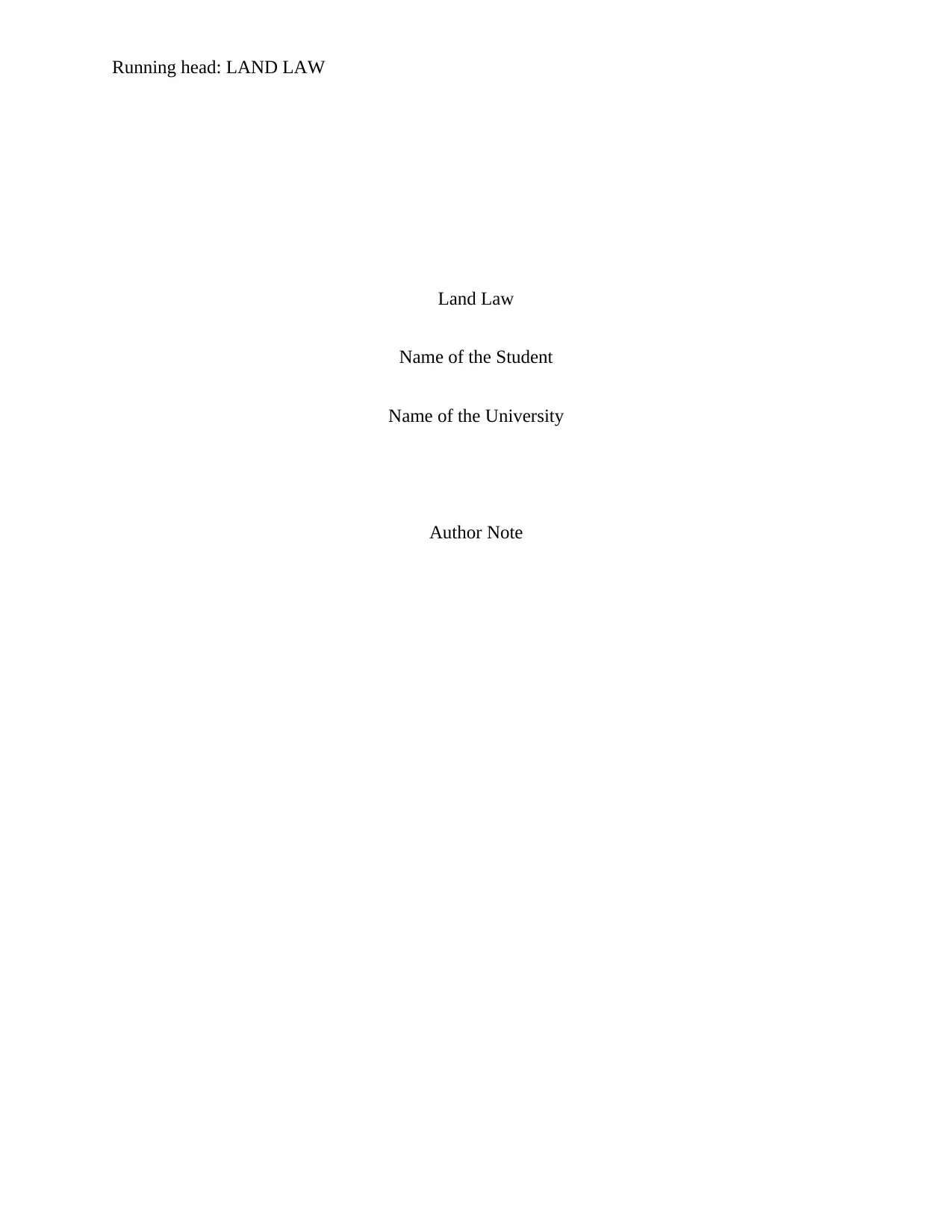
Running head: LAND LAW
Land Law
Name of the Student
Name of the University
Author Note
Land Law
Name of the Student
Name of the University
Author Note
Secure Best Marks with AI Grader
Need help grading? Try our AI Grader for instant feedback on your assignments.
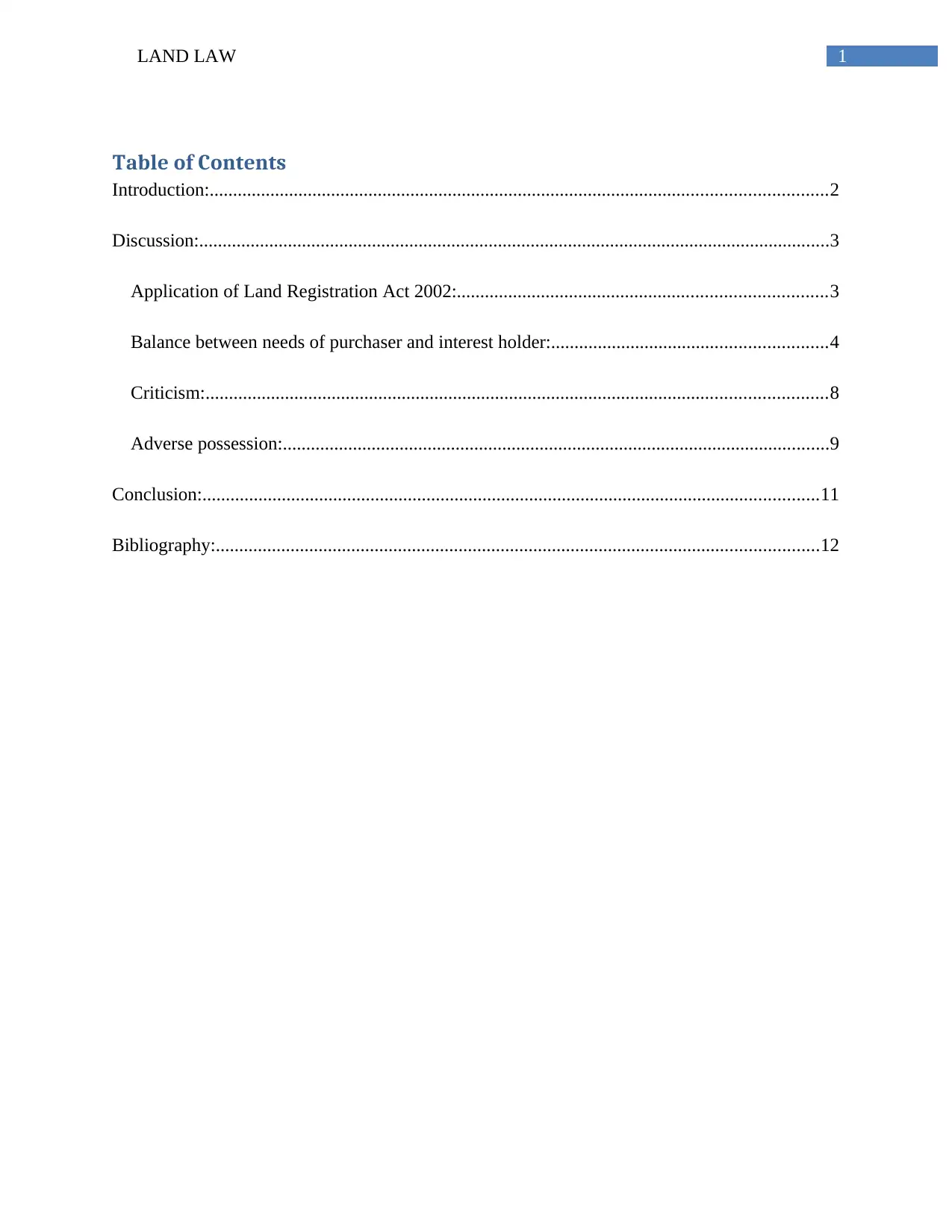
1LAND LAW
Table of Contents
Introduction:....................................................................................................................................2
Discussion:.......................................................................................................................................3
Application of Land Registration Act 2002:...............................................................................3
Balance between needs of purchaser and interest holder:...........................................................4
Criticism:.....................................................................................................................................8
Adverse possession:.....................................................................................................................9
Conclusion:....................................................................................................................................11
Bibliography:.................................................................................................................................12
Table of Contents
Introduction:....................................................................................................................................2
Discussion:.......................................................................................................................................3
Application of Land Registration Act 2002:...............................................................................3
Balance between needs of purchaser and interest holder:...........................................................4
Criticism:.....................................................................................................................................8
Adverse possession:.....................................................................................................................9
Conclusion:....................................................................................................................................11
Bibliography:.................................................................................................................................12
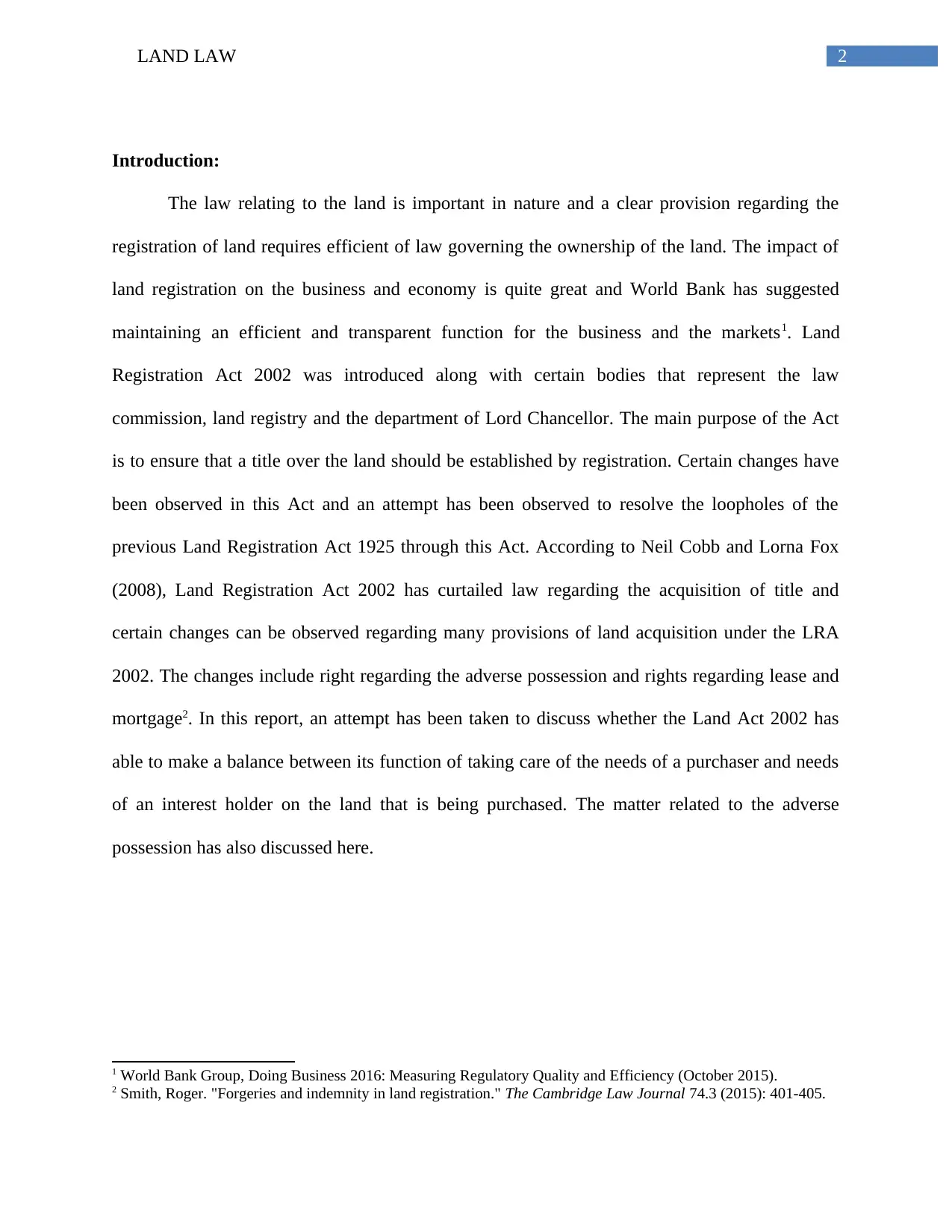
2LAND LAW
Introduction:
The law relating to the land is important in nature and a clear provision regarding the
registration of land requires efficient of law governing the ownership of the land. The impact of
land registration on the business and economy is quite great and World Bank has suggested
maintaining an efficient and transparent function for the business and the markets1. Land
Registration Act 2002 was introduced along with certain bodies that represent the law
commission, land registry and the department of Lord Chancellor. The main purpose of the Act
is to ensure that a title over the land should be established by registration. Certain changes have
been observed in this Act and an attempt has been observed to resolve the loopholes of the
previous Land Registration Act 1925 through this Act. According to Neil Cobb and Lorna Fox
(2008), Land Registration Act 2002 has curtailed law regarding the acquisition of title and
certain changes can be observed regarding many provisions of land acquisition under the LRA
2002. The changes include right regarding the adverse possession and rights regarding lease and
mortgage2. In this report, an attempt has been taken to discuss whether the Land Act 2002 has
able to make a balance between its function of taking care of the needs of a purchaser and needs
of an interest holder on the land that is being purchased. The matter related to the adverse
possession has also discussed here.
1 World Bank Group, Doing Business 2016: Measuring Regulatory Quality and Efficiency (October 2015).
2 Smith, Roger. "Forgeries and indemnity in land registration." The Cambridge Law Journal 74.3 (2015): 401-405.
Introduction:
The law relating to the land is important in nature and a clear provision regarding the
registration of land requires efficient of law governing the ownership of the land. The impact of
land registration on the business and economy is quite great and World Bank has suggested
maintaining an efficient and transparent function for the business and the markets1. Land
Registration Act 2002 was introduced along with certain bodies that represent the law
commission, land registry and the department of Lord Chancellor. The main purpose of the Act
is to ensure that a title over the land should be established by registration. Certain changes have
been observed in this Act and an attempt has been observed to resolve the loopholes of the
previous Land Registration Act 1925 through this Act. According to Neil Cobb and Lorna Fox
(2008), Land Registration Act 2002 has curtailed law regarding the acquisition of title and
certain changes can be observed regarding many provisions of land acquisition under the LRA
2002. The changes include right regarding the adverse possession and rights regarding lease and
mortgage2. In this report, an attempt has been taken to discuss whether the Land Act 2002 has
able to make a balance between its function of taking care of the needs of a purchaser and needs
of an interest holder on the land that is being purchased. The matter related to the adverse
possession has also discussed here.
1 World Bank Group, Doing Business 2016: Measuring Regulatory Quality and Efficiency (October 2015).
2 Smith, Roger. "Forgeries and indemnity in land registration." The Cambridge Law Journal 74.3 (2015): 401-405.
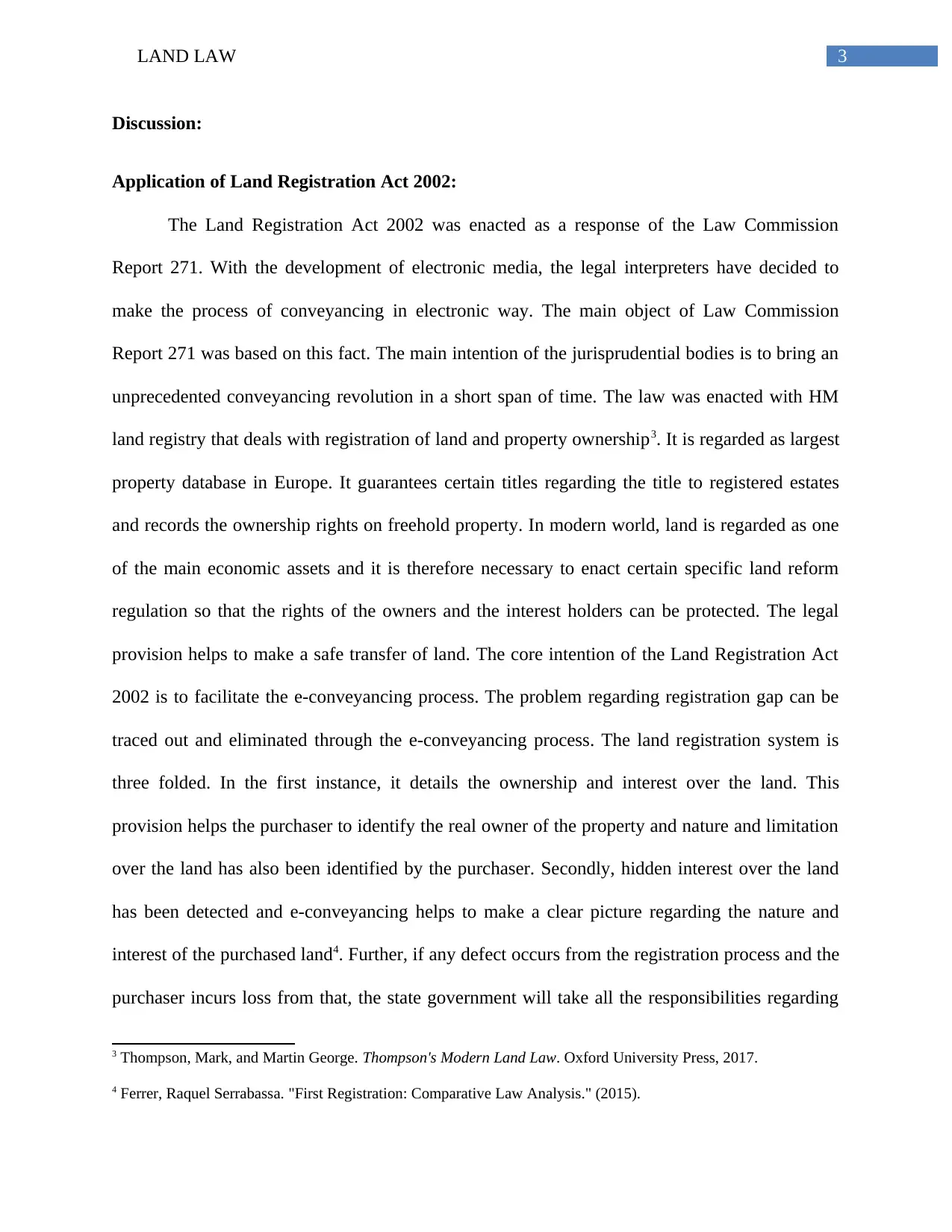
3LAND LAW
Discussion:
Application of Land Registration Act 2002:
The Land Registration Act 2002 was enacted as a response of the Law Commission
Report 271. With the development of electronic media, the legal interpreters have decided to
make the process of conveyancing in electronic way. The main object of Law Commission
Report 271 was based on this fact. The main intention of the jurisprudential bodies is to bring an
unprecedented conveyancing revolution in a short span of time. The law was enacted with HM
land registry that deals with registration of land and property ownership3. It is regarded as largest
property database in Europe. It guarantees certain titles regarding the title to registered estates
and records the ownership rights on freehold property. In modern world, land is regarded as one
of the main economic assets and it is therefore necessary to enact certain specific land reform
regulation so that the rights of the owners and the interest holders can be protected. The legal
provision helps to make a safe transfer of land. The core intention of the Land Registration Act
2002 is to facilitate the e-conveyancing process. The problem regarding registration gap can be
traced out and eliminated through the e-conveyancing process. The land registration system is
three folded. In the first instance, it details the ownership and interest over the land. This
provision helps the purchaser to identify the real owner of the property and nature and limitation
over the land has also been identified by the purchaser. Secondly, hidden interest over the land
has been detected and e-conveyancing helps to make a clear picture regarding the nature and
interest of the purchased land4. Further, if any defect occurs from the registration process and the
purchaser incurs loss from that, the state government will take all the responsibilities regarding
3 Thompson, Mark, and Martin George. Thompson's Modern Land Law. Oxford University Press, 2017.
4 Ferrer, Raquel Serrabassa. "First Registration: Comparative Law Analysis." (2015).
Discussion:
Application of Land Registration Act 2002:
The Land Registration Act 2002 was enacted as a response of the Law Commission
Report 271. With the development of electronic media, the legal interpreters have decided to
make the process of conveyancing in electronic way. The main object of Law Commission
Report 271 was based on this fact. The main intention of the jurisprudential bodies is to bring an
unprecedented conveyancing revolution in a short span of time. The law was enacted with HM
land registry that deals with registration of land and property ownership3. It is regarded as largest
property database in Europe. It guarantees certain titles regarding the title to registered estates
and records the ownership rights on freehold property. In modern world, land is regarded as one
of the main economic assets and it is therefore necessary to enact certain specific land reform
regulation so that the rights of the owners and the interest holders can be protected. The legal
provision helps to make a safe transfer of land. The core intention of the Land Registration Act
2002 is to facilitate the e-conveyancing process. The problem regarding registration gap can be
traced out and eliminated through the e-conveyancing process. The land registration system is
three folded. In the first instance, it details the ownership and interest over the land. This
provision helps the purchaser to identify the real owner of the property and nature and limitation
over the land has also been identified by the purchaser. Secondly, hidden interest over the land
has been detected and e-conveyancing helps to make a clear picture regarding the nature and
interest of the purchased land4. Further, if any defect occurs from the registration process and the
purchaser incurs loss from that, the state government will take all the responsibilities regarding
3 Thompson, Mark, and Martin George. Thompson's Modern Land Law. Oxford University Press, 2017.
4 Ferrer, Raquel Serrabassa. "First Registration: Comparative Law Analysis." (2015).
Secure Best Marks with AI Grader
Need help grading? Try our AI Grader for instant feedback on your assignments.
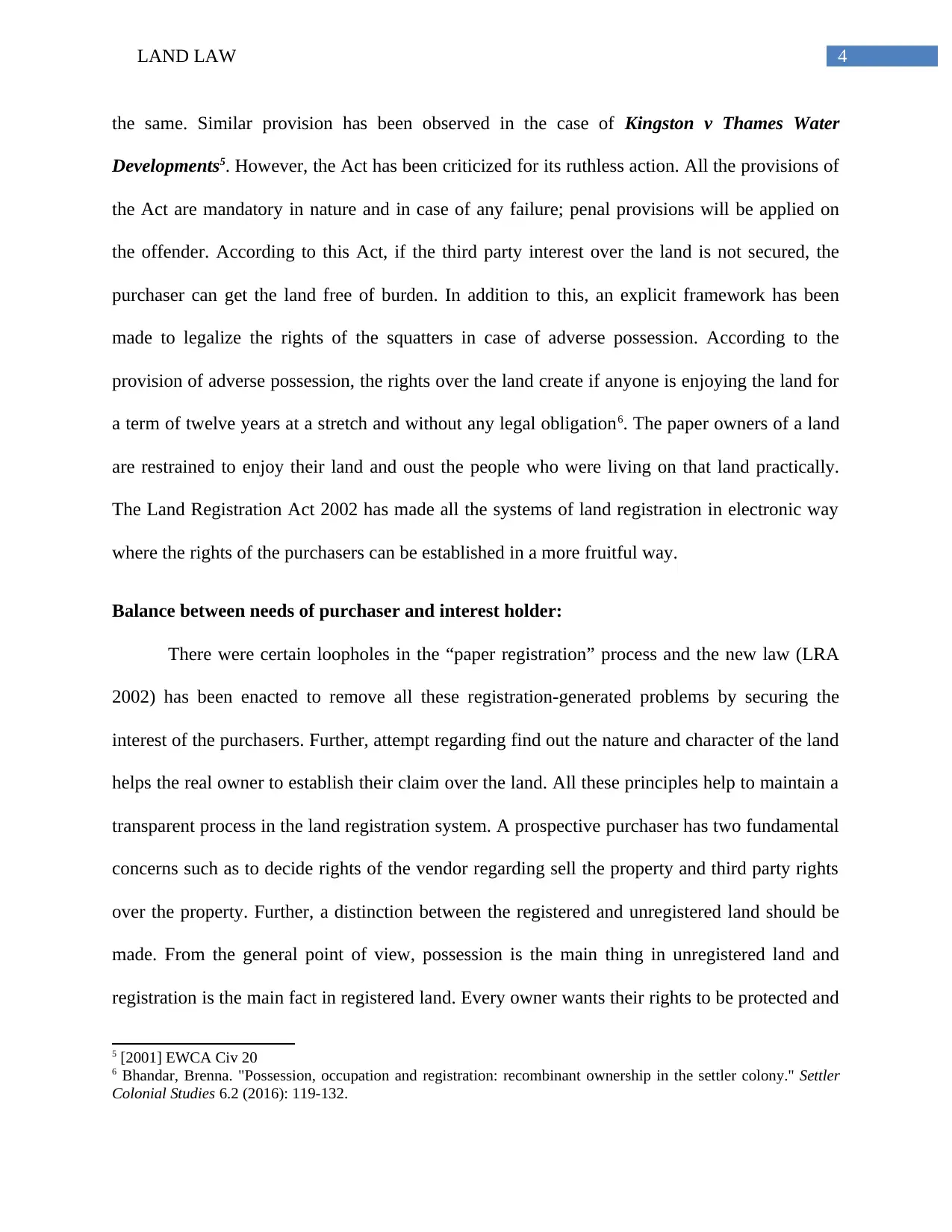
4LAND LAW
the same. Similar provision has been observed in the case of Kingston v Thames Water
Developments5. However, the Act has been criticized for its ruthless action. All the provisions of
the Act are mandatory in nature and in case of any failure; penal provisions will be applied on
the offender. According to this Act, if the third party interest over the land is not secured, the
purchaser can get the land free of burden. In addition to this, an explicit framework has been
made to legalize the rights of the squatters in case of adverse possession. According to the
provision of adverse possession, the rights over the land create if anyone is enjoying the land for
a term of twelve years at a stretch and without any legal obligation6. The paper owners of a land
are restrained to enjoy their land and oust the people who were living on that land practically.
The Land Registration Act 2002 has made all the systems of land registration in electronic way
where the rights of the purchasers can be established in a more fruitful way.
Balance between needs of purchaser and interest holder:
There were certain loopholes in the “paper registration” process and the new law (LRA
2002) has been enacted to remove all these registration-generated problems by securing the
interest of the purchasers. Further, attempt regarding find out the nature and character of the land
helps the real owner to establish their claim over the land. All these principles help to maintain a
transparent process in the land registration system. A prospective purchaser has two fundamental
concerns such as to decide rights of the vendor regarding sell the property and third party rights
over the property. Further, a distinction between the registered and unregistered land should be
made. From the general point of view, possession is the main thing in unregistered land and
registration is the main fact in registered land. Every owner wants their rights to be protected and
5 [2001] EWCA Civ 20
6 Bhandar, Brenna. "Possession, occupation and registration: recombinant ownership in the settler colony." Settler
Colonial Studies 6.2 (2016): 119-132.
the same. Similar provision has been observed in the case of Kingston v Thames Water
Developments5. However, the Act has been criticized for its ruthless action. All the provisions of
the Act are mandatory in nature and in case of any failure; penal provisions will be applied on
the offender. According to this Act, if the third party interest over the land is not secured, the
purchaser can get the land free of burden. In addition to this, an explicit framework has been
made to legalize the rights of the squatters in case of adverse possession. According to the
provision of adverse possession, the rights over the land create if anyone is enjoying the land for
a term of twelve years at a stretch and without any legal obligation6. The paper owners of a land
are restrained to enjoy their land and oust the people who were living on that land practically.
The Land Registration Act 2002 has made all the systems of land registration in electronic way
where the rights of the purchasers can be established in a more fruitful way.
Balance between needs of purchaser and interest holder:
There were certain loopholes in the “paper registration” process and the new law (LRA
2002) has been enacted to remove all these registration-generated problems by securing the
interest of the purchasers. Further, attempt regarding find out the nature and character of the land
helps the real owner to establish their claim over the land. All these principles help to maintain a
transparent process in the land registration system. A prospective purchaser has two fundamental
concerns such as to decide rights of the vendor regarding sell the property and third party rights
over the property. Further, a distinction between the registered and unregistered land should be
made. From the general point of view, possession is the main thing in unregistered land and
registration is the main fact in registered land. Every owner wants their rights to be protected and
5 [2001] EWCA Civ 20
6 Bhandar, Brenna. "Possession, occupation and registration: recombinant ownership in the settler colony." Settler
Colonial Studies 6.2 (2016): 119-132.
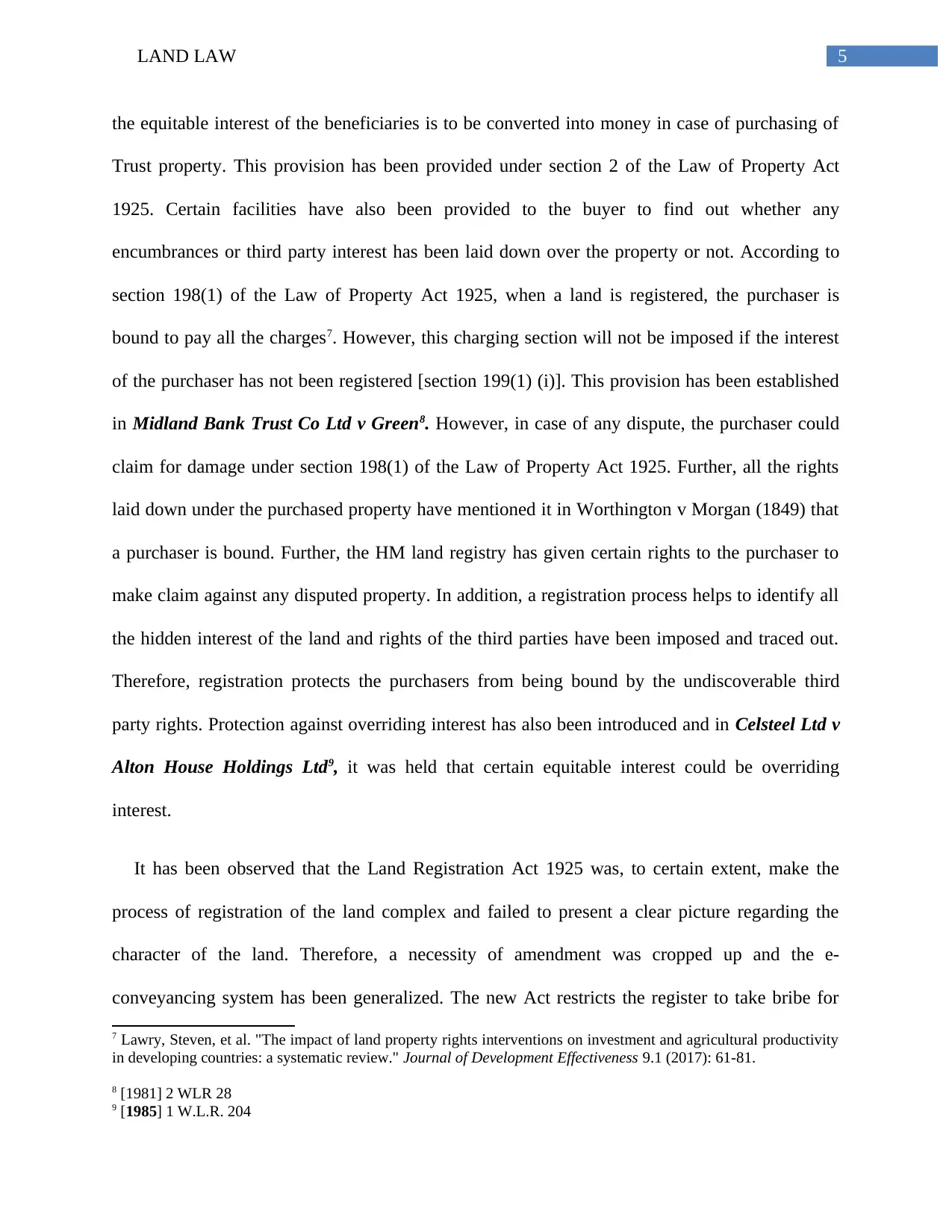
5LAND LAW
the equitable interest of the beneficiaries is to be converted into money in case of purchasing of
Trust property. This provision has been provided under section 2 of the Law of Property Act
1925. Certain facilities have also been provided to the buyer to find out whether any
encumbrances or third party interest has been laid down over the property or not. According to
section 198(1) of the Law of Property Act 1925, when a land is registered, the purchaser is
bound to pay all the charges7. However, this charging section will not be imposed if the interest
of the purchaser has not been registered [section 199(1) (i)]. This provision has been established
in Midland Bank Trust Co Ltd v Green8. However, in case of any dispute, the purchaser could
claim for damage under section 198(1) of the Law of Property Act 1925. Further, all the rights
laid down under the purchased property have mentioned it in Worthington v Morgan (1849) that
a purchaser is bound. Further, the HM land registry has given certain rights to the purchaser to
make claim against any disputed property. In addition, a registration process helps to identify all
the hidden interest of the land and rights of the third parties have been imposed and traced out.
Therefore, registration protects the purchasers from being bound by the undiscoverable third
party rights. Protection against overriding interest has also been introduced and in Celsteel Ltd v
Alton House Holdings Ltd9, it was held that certain equitable interest could be overriding
interest.
It has been observed that the Land Registration Act 1925 was, to certain extent, make the
process of registration of the land complex and failed to present a clear picture regarding the
character of the land. Therefore, a necessity of amendment was cropped up and the e-
conveyancing system has been generalized. The new Act restricts the register to take bribe for
7 Lawry, Steven, et al. "The impact of land property rights interventions on investment and agricultural productivity
in developing countries: a systematic review." Journal of Development Effectiveness 9.1 (2017): 61-81.
8 [1981] 2 WLR 28
9 [1985] 1 W.L.R. 204
the equitable interest of the beneficiaries is to be converted into money in case of purchasing of
Trust property. This provision has been provided under section 2 of the Law of Property Act
1925. Certain facilities have also been provided to the buyer to find out whether any
encumbrances or third party interest has been laid down over the property or not. According to
section 198(1) of the Law of Property Act 1925, when a land is registered, the purchaser is
bound to pay all the charges7. However, this charging section will not be imposed if the interest
of the purchaser has not been registered [section 199(1) (i)]. This provision has been established
in Midland Bank Trust Co Ltd v Green8. However, in case of any dispute, the purchaser could
claim for damage under section 198(1) of the Law of Property Act 1925. Further, all the rights
laid down under the purchased property have mentioned it in Worthington v Morgan (1849) that
a purchaser is bound. Further, the HM land registry has given certain rights to the purchaser to
make claim against any disputed property. In addition, a registration process helps to identify all
the hidden interest of the land and rights of the third parties have been imposed and traced out.
Therefore, registration protects the purchasers from being bound by the undiscoverable third
party rights. Protection against overriding interest has also been introduced and in Celsteel Ltd v
Alton House Holdings Ltd9, it was held that certain equitable interest could be overriding
interest.
It has been observed that the Land Registration Act 1925 was, to certain extent, make the
process of registration of the land complex and failed to present a clear picture regarding the
character of the land. Therefore, a necessity of amendment was cropped up and the e-
conveyancing system has been generalized. The new Act restricts the register to take bribe for
7 Lawry, Steven, et al. "The impact of land property rights interventions on investment and agricultural productivity
in developing countries: a systematic review." Journal of Development Effectiveness 9.1 (2017): 61-81.
8 [1981] 2 WLR 28
9 [1985] 1 W.L.R. 204
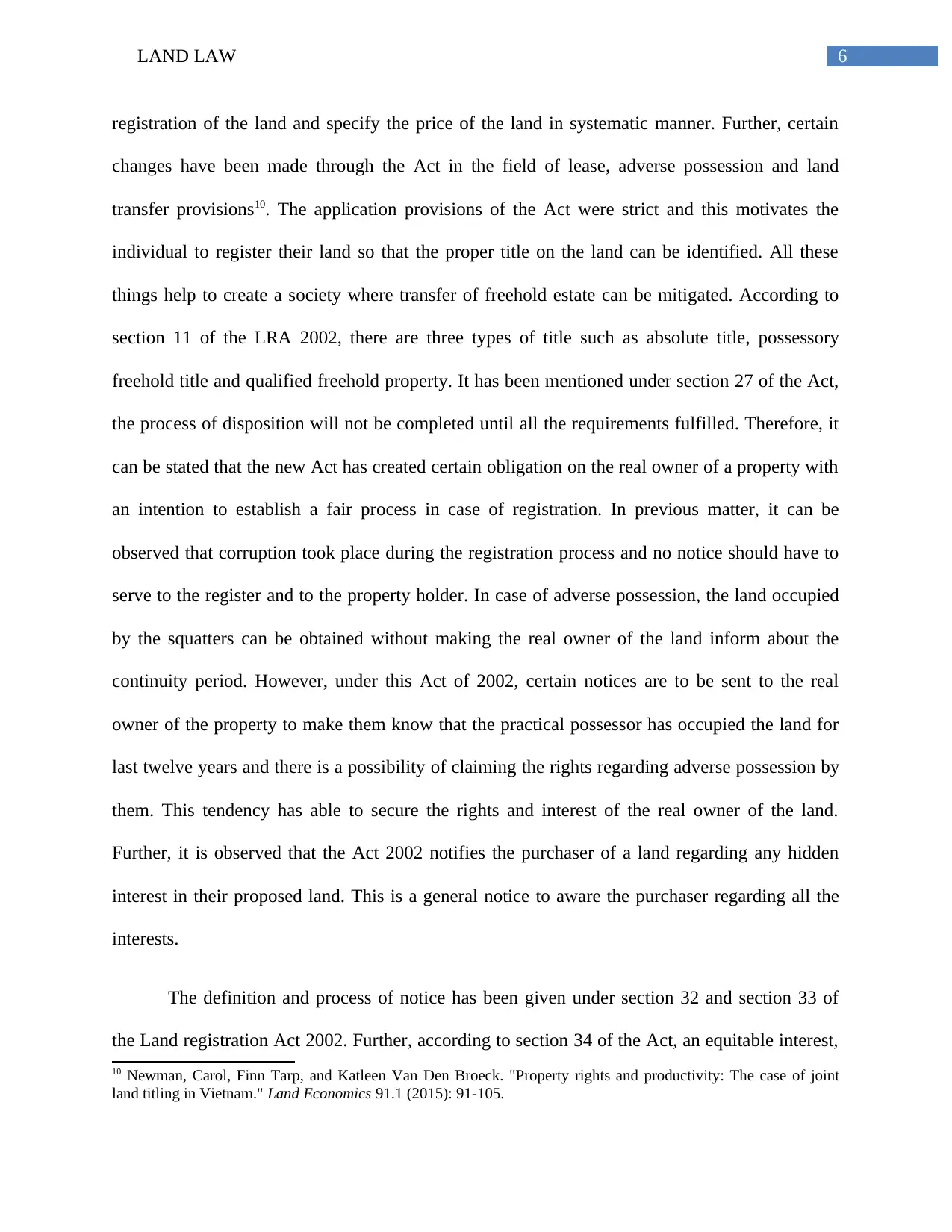
6LAND LAW
registration of the land and specify the price of the land in systematic manner. Further, certain
changes have been made through the Act in the field of lease, adverse possession and land
transfer provisions10. The application provisions of the Act were strict and this motivates the
individual to register their land so that the proper title on the land can be identified. All these
things help to create a society where transfer of freehold estate can be mitigated. According to
section 11 of the LRA 2002, there are three types of title such as absolute title, possessory
freehold title and qualified freehold property. It has been mentioned under section 27 of the Act,
the process of disposition will not be completed until all the requirements fulfilled. Therefore, it
can be stated that the new Act has created certain obligation on the real owner of a property with
an intention to establish a fair process in case of registration. In previous matter, it can be
observed that corruption took place during the registration process and no notice should have to
serve to the register and to the property holder. In case of adverse possession, the land occupied
by the squatters can be obtained without making the real owner of the land inform about the
continuity period. However, under this Act of 2002, certain notices are to be sent to the real
owner of the property to make them know that the practical possessor has occupied the land for
last twelve years and there is a possibility of claiming the rights regarding adverse possession by
them. This tendency has able to secure the rights and interest of the real owner of the land.
Further, it is observed that the Act 2002 notifies the purchaser of a land regarding any hidden
interest in their proposed land. This is a general notice to aware the purchaser regarding all the
interests.
The definition and process of notice has been given under section 32 and section 33 of
the Land registration Act 2002. Further, according to section 34 of the Act, an equitable interest,
10 Newman, Carol, Finn Tarp, and Katleen Van Den Broeck. "Property rights and productivity: The case of joint
land titling in Vietnam." Land Economics 91.1 (2015): 91-105.
registration of the land and specify the price of the land in systematic manner. Further, certain
changes have been made through the Act in the field of lease, adverse possession and land
transfer provisions10. The application provisions of the Act were strict and this motivates the
individual to register their land so that the proper title on the land can be identified. All these
things help to create a society where transfer of freehold estate can be mitigated. According to
section 11 of the LRA 2002, there are three types of title such as absolute title, possessory
freehold title and qualified freehold property. It has been mentioned under section 27 of the Act,
the process of disposition will not be completed until all the requirements fulfilled. Therefore, it
can be stated that the new Act has created certain obligation on the real owner of a property with
an intention to establish a fair process in case of registration. In previous matter, it can be
observed that corruption took place during the registration process and no notice should have to
serve to the register and to the property holder. In case of adverse possession, the land occupied
by the squatters can be obtained without making the real owner of the land inform about the
continuity period. However, under this Act of 2002, certain notices are to be sent to the real
owner of the property to make them know that the practical possessor has occupied the land for
last twelve years and there is a possibility of claiming the rights regarding adverse possession by
them. This tendency has able to secure the rights and interest of the real owner of the land.
Further, it is observed that the Act 2002 notifies the purchaser of a land regarding any hidden
interest in their proposed land. This is a general notice to aware the purchaser regarding all the
interests.
The definition and process of notice has been given under section 32 and section 33 of
the Land registration Act 2002. Further, according to section 34 of the Act, an equitable interest,
10 Newman, Carol, Finn Tarp, and Katleen Van Den Broeck. "Property rights and productivity: The case of joint
land titling in Vietnam." Land Economics 91.1 (2015): 91-105.
Paraphrase This Document
Need a fresh take? Get an instant paraphrase of this document with our AI Paraphraser
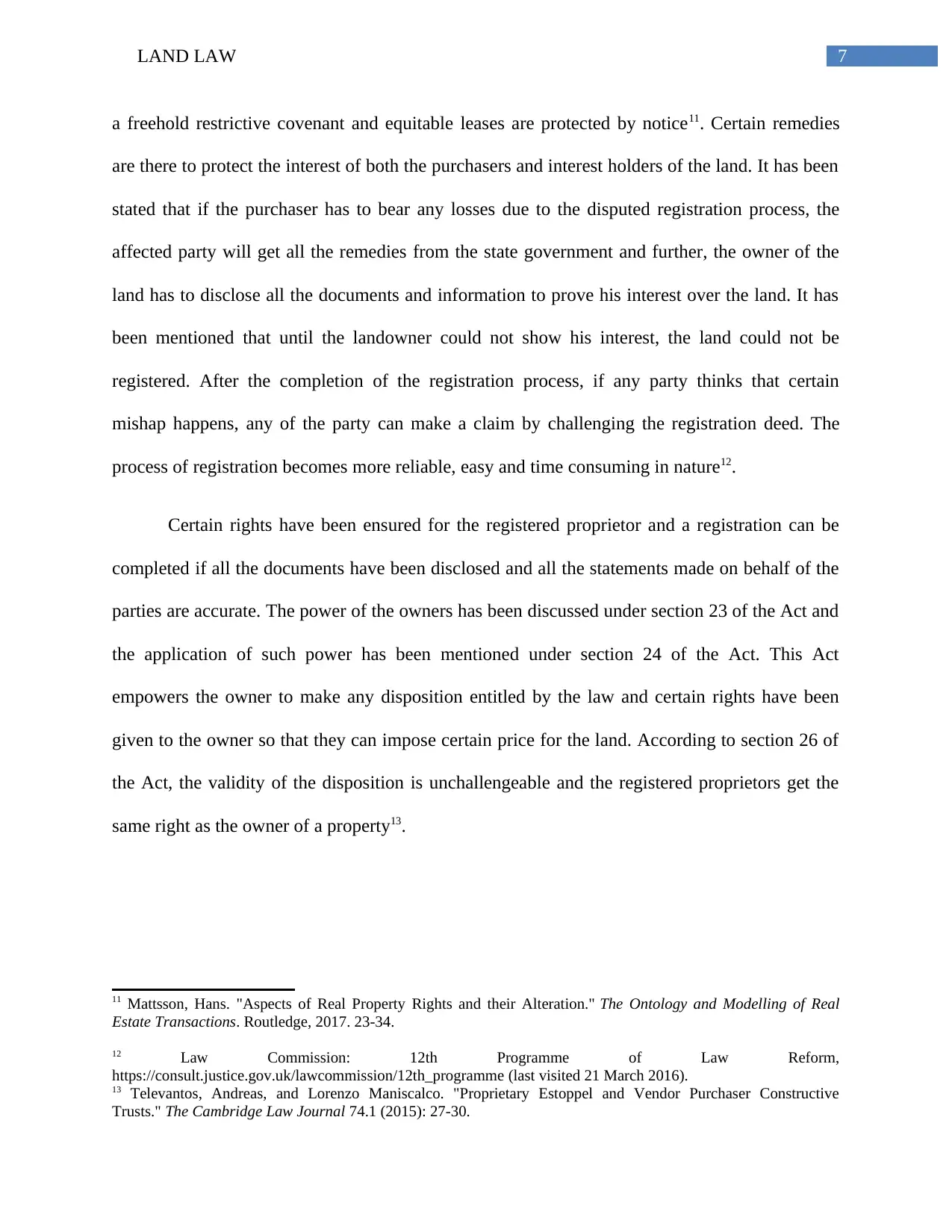
7LAND LAW
a freehold restrictive covenant and equitable leases are protected by notice11. Certain remedies
are there to protect the interest of both the purchasers and interest holders of the land. It has been
stated that if the purchaser has to bear any losses due to the disputed registration process, the
affected party will get all the remedies from the state government and further, the owner of the
land has to disclose all the documents and information to prove his interest over the land. It has
been mentioned that until the landowner could not show his interest, the land could not be
registered. After the completion of the registration process, if any party thinks that certain
mishap happens, any of the party can make a claim by challenging the registration deed. The
process of registration becomes more reliable, easy and time consuming in nature12.
Certain rights have been ensured for the registered proprietor and a registration can be
completed if all the documents have been disclosed and all the statements made on behalf of the
parties are accurate. The power of the owners has been discussed under section 23 of the Act and
the application of such power has been mentioned under section 24 of the Act. This Act
empowers the owner to make any disposition entitled by the law and certain rights have been
given to the owner so that they can impose certain price for the land. According to section 26 of
the Act, the validity of the disposition is unchallengeable and the registered proprietors get the
same right as the owner of a property13.
11 Mattsson, Hans. "Aspects of Real Property Rights and their Alteration." The Ontology and Modelling of Real
Estate Transactions. Routledge, 2017. 23-34.
12 Law Commission: 12th Programme of Law Reform,
https://consult.justice.gov.uk/lawcommission/12th_programme (last visited 21 March 2016).
13 Televantos, Andreas, and Lorenzo Maniscalco. "Proprietary Estoppel and Vendor Purchaser Constructive
Trusts." The Cambridge Law Journal 74.1 (2015): 27-30.
a freehold restrictive covenant and equitable leases are protected by notice11. Certain remedies
are there to protect the interest of both the purchasers and interest holders of the land. It has been
stated that if the purchaser has to bear any losses due to the disputed registration process, the
affected party will get all the remedies from the state government and further, the owner of the
land has to disclose all the documents and information to prove his interest over the land. It has
been mentioned that until the landowner could not show his interest, the land could not be
registered. After the completion of the registration process, if any party thinks that certain
mishap happens, any of the party can make a claim by challenging the registration deed. The
process of registration becomes more reliable, easy and time consuming in nature12.
Certain rights have been ensured for the registered proprietor and a registration can be
completed if all the documents have been disclosed and all the statements made on behalf of the
parties are accurate. The power of the owners has been discussed under section 23 of the Act and
the application of such power has been mentioned under section 24 of the Act. This Act
empowers the owner to make any disposition entitled by the law and certain rights have been
given to the owner so that they can impose certain price for the land. According to section 26 of
the Act, the validity of the disposition is unchallengeable and the registered proprietors get the
same right as the owner of a property13.
11 Mattsson, Hans. "Aspects of Real Property Rights and their Alteration." The Ontology and Modelling of Real
Estate Transactions. Routledge, 2017. 23-34.
12 Law Commission: 12th Programme of Law Reform,
https://consult.justice.gov.uk/lawcommission/12th_programme (last visited 21 March 2016).
13 Televantos, Andreas, and Lorenzo Maniscalco. "Proprietary Estoppel and Vendor Purchaser Constructive
Trusts." The Cambridge Law Journal 74.1 (2015): 27-30.
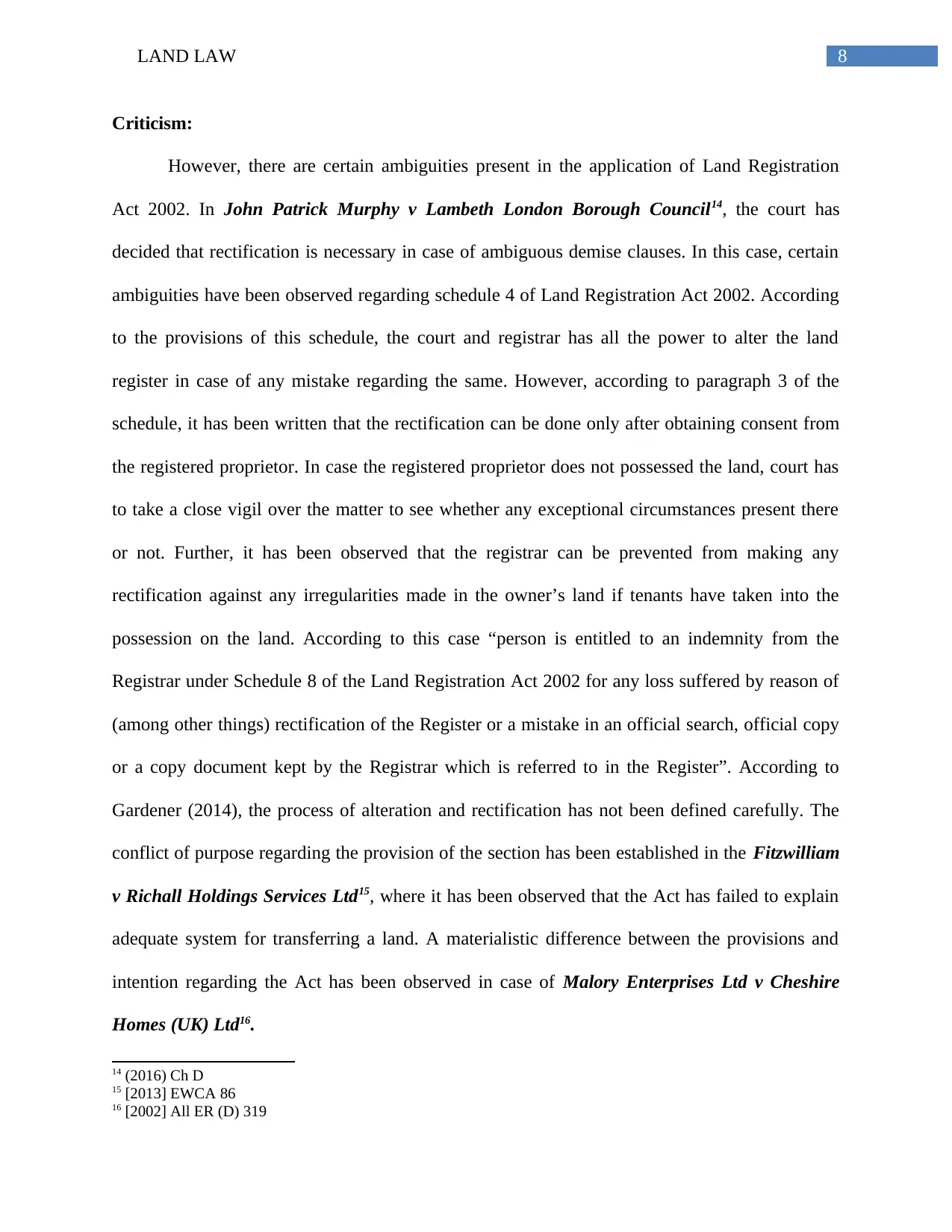
8LAND LAW
Criticism:
However, there are certain ambiguities present in the application of Land Registration
Act 2002. In John Patrick Murphy v Lambeth London Borough Council14, the court has
decided that rectification is necessary in case of ambiguous demise clauses. In this case, certain
ambiguities have been observed regarding schedule 4 of Land Registration Act 2002. According
to the provisions of this schedule, the court and registrar has all the power to alter the land
register in case of any mistake regarding the same. However, according to paragraph 3 of the
schedule, it has been written that the rectification can be done only after obtaining consent from
the registered proprietor. In case the registered proprietor does not possessed the land, court has
to take a close vigil over the matter to see whether any exceptional circumstances present there
or not. Further, it has been observed that the registrar can be prevented from making any
rectification against any irregularities made in the owner’s land if tenants have taken into the
possession on the land. According to this case “person is entitled to an indemnity from the
Registrar under Schedule 8 of the Land Registration Act 2002 for any loss suffered by reason of
(among other things) rectification of the Register or a mistake in an official search, official copy
or a copy document kept by the Registrar which is referred to in the Register”. According to
Gardener (2014), the process of alteration and rectification has not been defined carefully. The
conflict of purpose regarding the provision of the section has been established in the Fitzwilliam
v Richall Holdings Services Ltd15, where it has been observed that the Act has failed to explain
adequate system for transferring a land. A materialistic difference between the provisions and
intention regarding the Act has been observed in case of Malory Enterprises Ltd v Cheshire
Homes (UK) Ltd16.
14 (2016) Ch D
15 [2013] EWCA 86
16 [2002] All ER (D) 319
Criticism:
However, there are certain ambiguities present in the application of Land Registration
Act 2002. In John Patrick Murphy v Lambeth London Borough Council14, the court has
decided that rectification is necessary in case of ambiguous demise clauses. In this case, certain
ambiguities have been observed regarding schedule 4 of Land Registration Act 2002. According
to the provisions of this schedule, the court and registrar has all the power to alter the land
register in case of any mistake regarding the same. However, according to paragraph 3 of the
schedule, it has been written that the rectification can be done only after obtaining consent from
the registered proprietor. In case the registered proprietor does not possessed the land, court has
to take a close vigil over the matter to see whether any exceptional circumstances present there
or not. Further, it has been observed that the registrar can be prevented from making any
rectification against any irregularities made in the owner’s land if tenants have taken into the
possession on the land. According to this case “person is entitled to an indemnity from the
Registrar under Schedule 8 of the Land Registration Act 2002 for any loss suffered by reason of
(among other things) rectification of the Register or a mistake in an official search, official copy
or a copy document kept by the Registrar which is referred to in the Register”. According to
Gardener (2014), the process of alteration and rectification has not been defined carefully. The
conflict of purpose regarding the provision of the section has been established in the Fitzwilliam
v Richall Holdings Services Ltd15, where it has been observed that the Act has failed to explain
adequate system for transferring a land. A materialistic difference between the provisions and
intention regarding the Act has been observed in case of Malory Enterprises Ltd v Cheshire
Homes (UK) Ltd16.
14 (2016) Ch D
15 [2013] EWCA 86
16 [2002] All ER (D) 319
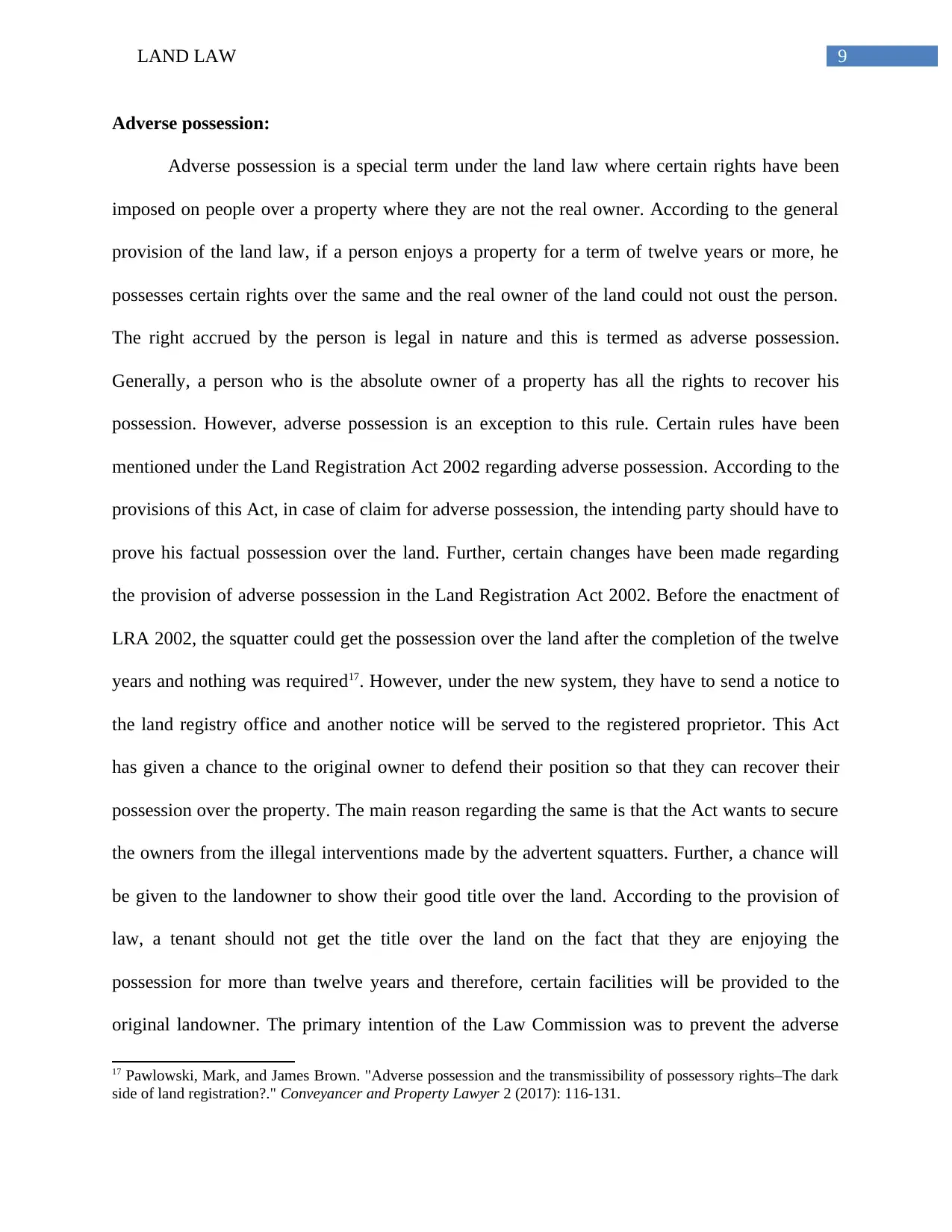
9LAND LAW
Adverse possession:
Adverse possession is a special term under the land law where certain rights have been
imposed on people over a property where they are not the real owner. According to the general
provision of the land law, if a person enjoys a property for a term of twelve years or more, he
possesses certain rights over the same and the real owner of the land could not oust the person.
The right accrued by the person is legal in nature and this is termed as adverse possession.
Generally, a person who is the absolute owner of a property has all the rights to recover his
possession. However, adverse possession is an exception to this rule. Certain rules have been
mentioned under the Land Registration Act 2002 regarding adverse possession. According to the
provisions of this Act, in case of claim for adverse possession, the intending party should have to
prove his factual possession over the land. Further, certain changes have been made regarding
the provision of adverse possession in the Land Registration Act 2002. Before the enactment of
LRA 2002, the squatter could get the possession over the land after the completion of the twelve
years and nothing was required17. However, under the new system, they have to send a notice to
the land registry office and another notice will be served to the registered proprietor. This Act
has given a chance to the original owner to defend their position so that they can recover their
possession over the property. The main reason regarding the same is that the Act wants to secure
the owners from the illegal interventions made by the advertent squatters. Further, a chance will
be given to the landowner to show their good title over the land. According to the provision of
law, a tenant should not get the title over the land on the fact that they are enjoying the
possession for more than twelve years and therefore, certain facilities will be provided to the
original landowner. The primary intention of the Law Commission was to prevent the adverse
17 Pawlowski, Mark, and James Brown. "Adverse possession and the transmissibility of possessory rights–The dark
side of land registration?." Conveyancer and Property Lawyer 2 (2017): 116-131.
Adverse possession:
Adverse possession is a special term under the land law where certain rights have been
imposed on people over a property where they are not the real owner. According to the general
provision of the land law, if a person enjoys a property for a term of twelve years or more, he
possesses certain rights over the same and the real owner of the land could not oust the person.
The right accrued by the person is legal in nature and this is termed as adverse possession.
Generally, a person who is the absolute owner of a property has all the rights to recover his
possession. However, adverse possession is an exception to this rule. Certain rules have been
mentioned under the Land Registration Act 2002 regarding adverse possession. According to the
provisions of this Act, in case of claim for adverse possession, the intending party should have to
prove his factual possession over the land. Further, certain changes have been made regarding
the provision of adverse possession in the Land Registration Act 2002. Before the enactment of
LRA 2002, the squatter could get the possession over the land after the completion of the twelve
years and nothing was required17. However, under the new system, they have to send a notice to
the land registry office and another notice will be served to the registered proprietor. This Act
has given a chance to the original owner to defend their position so that they can recover their
possession over the property. The main reason regarding the same is that the Act wants to secure
the owners from the illegal interventions made by the advertent squatters. Further, a chance will
be given to the landowner to show their good title over the land. According to the provision of
law, a tenant should not get the title over the land on the fact that they are enjoying the
possession for more than twelve years and therefore, certain facilities will be provided to the
original landowner. The primary intention of the Law Commission was to prevent the adverse
17 Pawlowski, Mark, and James Brown. "Adverse possession and the transmissibility of possessory rights–The dark
side of land registration?." Conveyancer and Property Lawyer 2 (2017): 116-131.
Secure Best Marks with AI Grader
Need help grading? Try our AI Grader for instant feedback on your assignments.
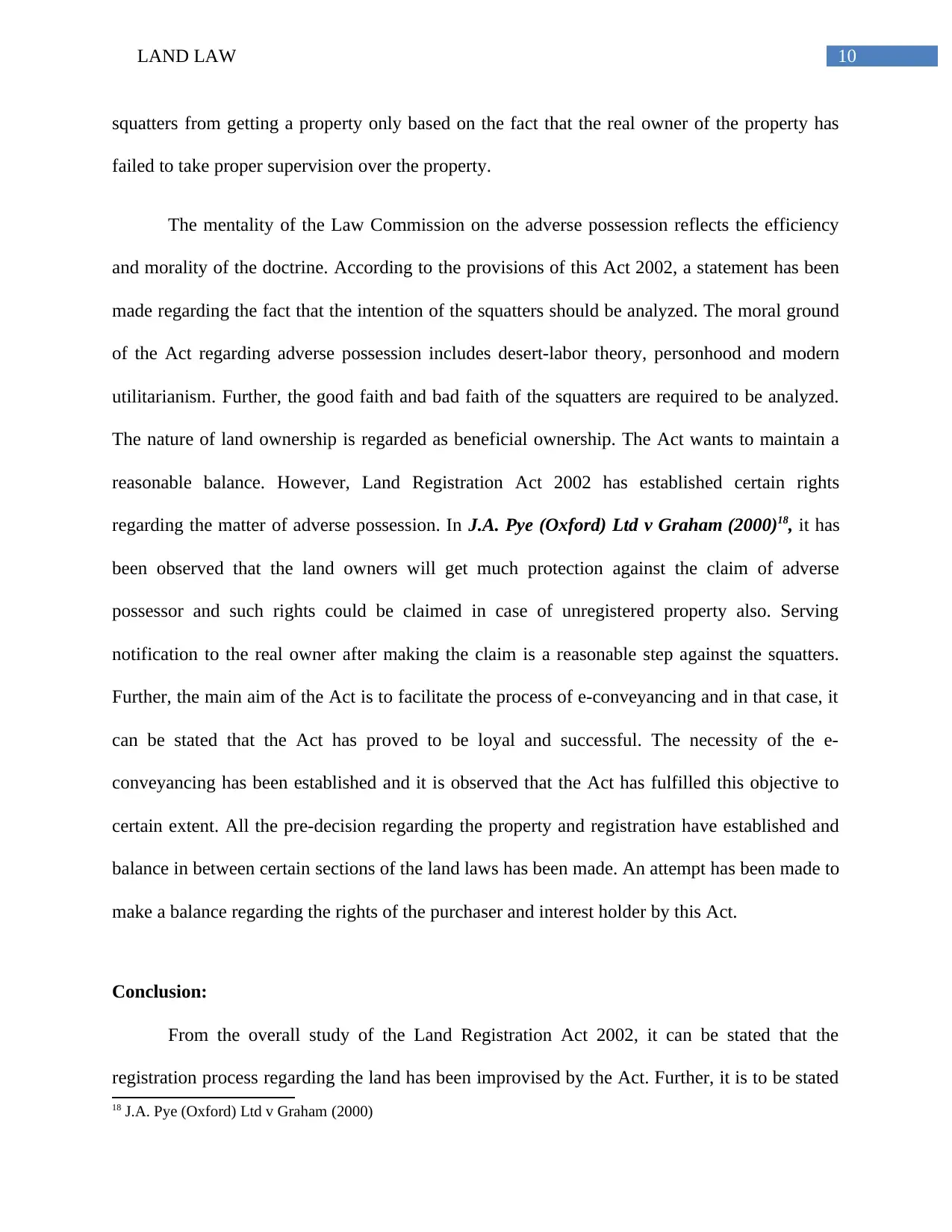
10LAND LAW
squatters from getting a property only based on the fact that the real owner of the property has
failed to take proper supervision over the property.
The mentality of the Law Commission on the adverse possession reflects the efficiency
and morality of the doctrine. According to the provisions of this Act 2002, a statement has been
made regarding the fact that the intention of the squatters should be analyzed. The moral ground
of the Act regarding adverse possession includes desert-labor theory, personhood and modern
utilitarianism. Further, the good faith and bad faith of the squatters are required to be analyzed.
The nature of land ownership is regarded as beneficial ownership. The Act wants to maintain a
reasonable balance. However, Land Registration Act 2002 has established certain rights
regarding the matter of adverse possession. In J.A. Pye (Oxford) Ltd v Graham (2000)18, it has
been observed that the land owners will get much protection against the claim of adverse
possessor and such rights could be claimed in case of unregistered property also. Serving
notification to the real owner after making the claim is a reasonable step against the squatters.
Further, the main aim of the Act is to facilitate the process of e-conveyancing and in that case, it
can be stated that the Act has proved to be loyal and successful. The necessity of the e-
conveyancing has been established and it is observed that the Act has fulfilled this objective to
certain extent. All the pre-decision regarding the property and registration have established and
balance in between certain sections of the land laws has been made. An attempt has been made to
make a balance regarding the rights of the purchaser and interest holder by this Act.
Conclusion:
From the overall study of the Land Registration Act 2002, it can be stated that the
registration process regarding the land has been improvised by the Act. Further, it is to be stated
18 J.A. Pye (Oxford) Ltd v Graham (2000)
squatters from getting a property only based on the fact that the real owner of the property has
failed to take proper supervision over the property.
The mentality of the Law Commission on the adverse possession reflects the efficiency
and morality of the doctrine. According to the provisions of this Act 2002, a statement has been
made regarding the fact that the intention of the squatters should be analyzed. The moral ground
of the Act regarding adverse possession includes desert-labor theory, personhood and modern
utilitarianism. Further, the good faith and bad faith of the squatters are required to be analyzed.
The nature of land ownership is regarded as beneficial ownership. The Act wants to maintain a
reasonable balance. However, Land Registration Act 2002 has established certain rights
regarding the matter of adverse possession. In J.A. Pye (Oxford) Ltd v Graham (2000)18, it has
been observed that the land owners will get much protection against the claim of adverse
possessor and such rights could be claimed in case of unregistered property also. Serving
notification to the real owner after making the claim is a reasonable step against the squatters.
Further, the main aim of the Act is to facilitate the process of e-conveyancing and in that case, it
can be stated that the Act has proved to be loyal and successful. The necessity of the e-
conveyancing has been established and it is observed that the Act has fulfilled this objective to
certain extent. All the pre-decision regarding the property and registration have established and
balance in between certain sections of the land laws has been made. An attempt has been made to
make a balance regarding the rights of the purchaser and interest holder by this Act.
Conclusion:
From the overall study of the Land Registration Act 2002, it can be stated that the
registration process regarding the land has been improvised by the Act. Further, it is to be stated
18 J.A. Pye (Oxford) Ltd v Graham (2000)
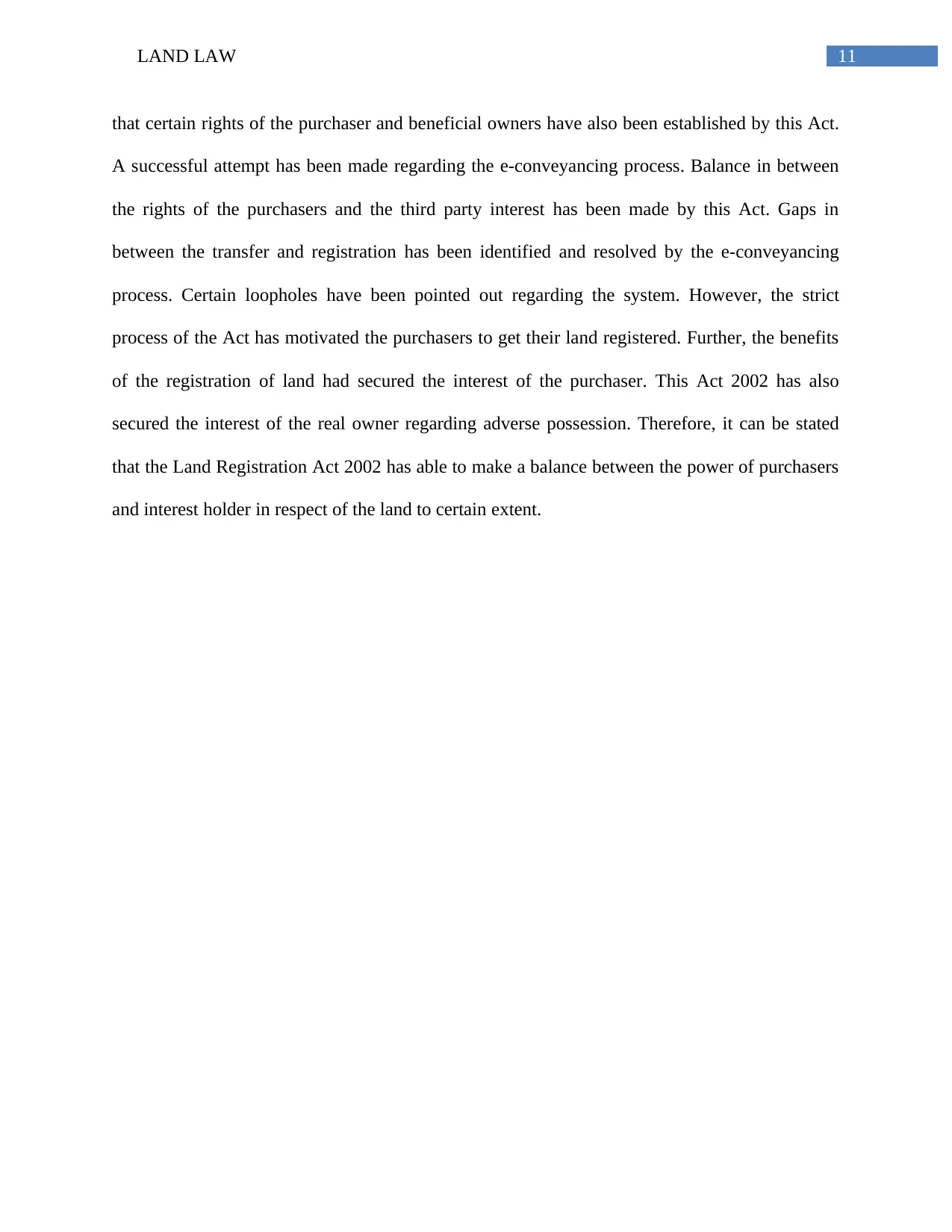
11LAND LAW
that certain rights of the purchaser and beneficial owners have also been established by this Act.
A successful attempt has been made regarding the e-conveyancing process. Balance in between
the rights of the purchasers and the third party interest has been made by this Act. Gaps in
between the transfer and registration has been identified and resolved by the e-conveyancing
process. Certain loopholes have been pointed out regarding the system. However, the strict
process of the Act has motivated the purchasers to get their land registered. Further, the benefits
of the registration of land had secured the interest of the purchaser. This Act 2002 has also
secured the interest of the real owner regarding adverse possession. Therefore, it can be stated
that the Land Registration Act 2002 has able to make a balance between the power of purchasers
and interest holder in respect of the land to certain extent.
that certain rights of the purchaser and beneficial owners have also been established by this Act.
A successful attempt has been made regarding the e-conveyancing process. Balance in between
the rights of the purchasers and the third party interest has been made by this Act. Gaps in
between the transfer and registration has been identified and resolved by the e-conveyancing
process. Certain loopholes have been pointed out regarding the system. However, the strict
process of the Act has motivated the purchasers to get their land registered. Further, the benefits
of the registration of land had secured the interest of the purchaser. This Act 2002 has also
secured the interest of the real owner regarding adverse possession. Therefore, it can be stated
that the Land Registration Act 2002 has able to make a balance between the power of purchasers
and interest holder in respect of the land to certain extent.
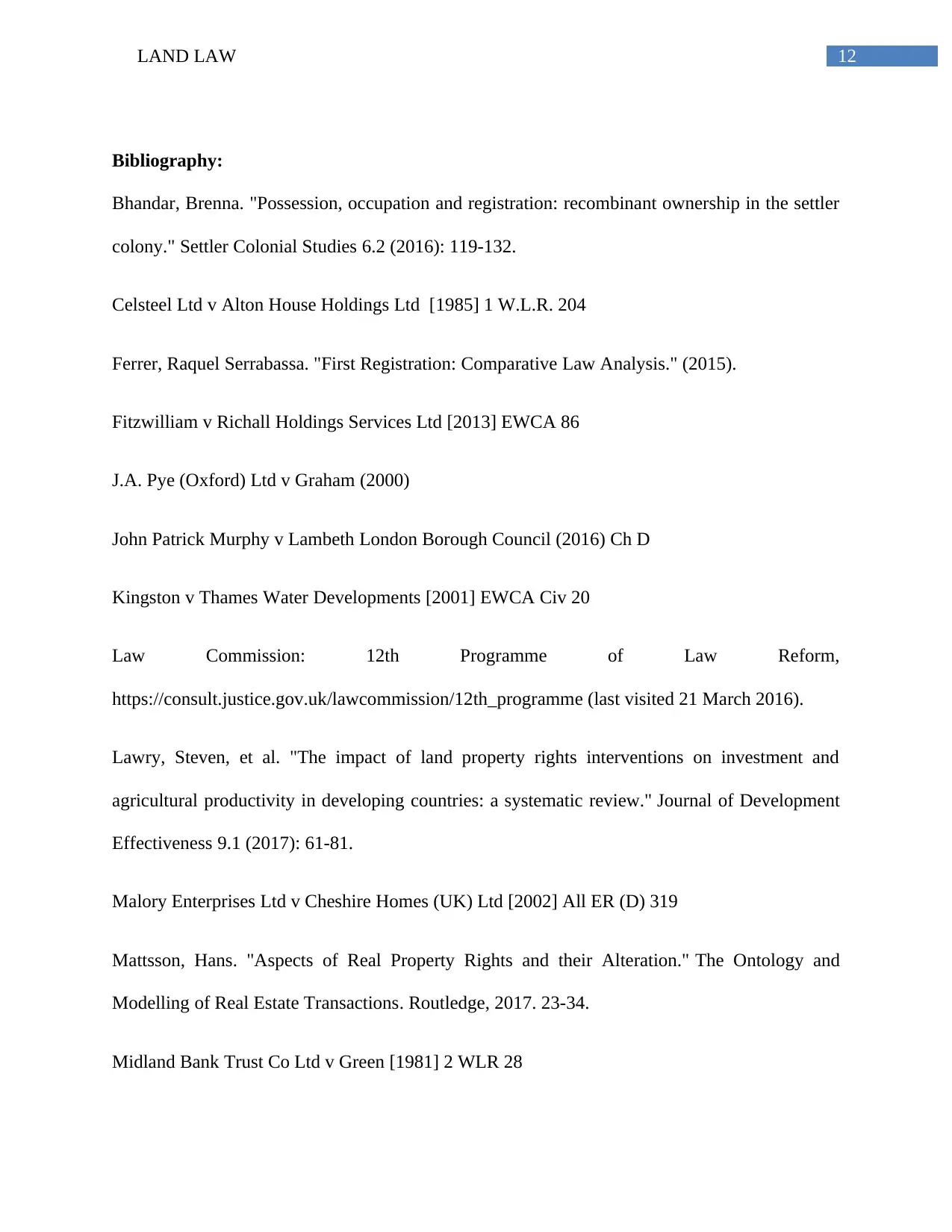
12LAND LAW
Bibliography:
Bhandar, Brenna. "Possession, occupation and registration: recombinant ownership in the settler
colony." Settler Colonial Studies 6.2 (2016): 119-132.
Celsteel Ltd v Alton House Holdings Ltd [1985] 1 W.L.R. 204
Ferrer, Raquel Serrabassa. "First Registration: Comparative Law Analysis." (2015).
Fitzwilliam v Richall Holdings Services Ltd [2013] EWCA 86
J.A. Pye (Oxford) Ltd v Graham (2000)
John Patrick Murphy v Lambeth London Borough Council (2016) Ch D
Kingston v Thames Water Developments [2001] EWCA Civ 20
Law Commission: 12th Programme of Law Reform,
https://consult.justice.gov.uk/lawcommission/12th_programme (last visited 21 March 2016).
Lawry, Steven, et al. "The impact of land property rights interventions on investment and
agricultural productivity in developing countries: a systematic review." Journal of Development
Effectiveness 9.1 (2017): 61-81.
Malory Enterprises Ltd v Cheshire Homes (UK) Ltd [2002] All ER (D) 319
Mattsson, Hans. "Aspects of Real Property Rights and their Alteration." The Ontology and
Modelling of Real Estate Transactions. Routledge, 2017. 23-34.
Midland Bank Trust Co Ltd v Green [1981] 2 WLR 28
Bibliography:
Bhandar, Brenna. "Possession, occupation and registration: recombinant ownership in the settler
colony." Settler Colonial Studies 6.2 (2016): 119-132.
Celsteel Ltd v Alton House Holdings Ltd [1985] 1 W.L.R. 204
Ferrer, Raquel Serrabassa. "First Registration: Comparative Law Analysis." (2015).
Fitzwilliam v Richall Holdings Services Ltd [2013] EWCA 86
J.A. Pye (Oxford) Ltd v Graham (2000)
John Patrick Murphy v Lambeth London Borough Council (2016) Ch D
Kingston v Thames Water Developments [2001] EWCA Civ 20
Law Commission: 12th Programme of Law Reform,
https://consult.justice.gov.uk/lawcommission/12th_programme (last visited 21 March 2016).
Lawry, Steven, et al. "The impact of land property rights interventions on investment and
agricultural productivity in developing countries: a systematic review." Journal of Development
Effectiveness 9.1 (2017): 61-81.
Malory Enterprises Ltd v Cheshire Homes (UK) Ltd [2002] All ER (D) 319
Mattsson, Hans. "Aspects of Real Property Rights and their Alteration." The Ontology and
Modelling of Real Estate Transactions. Routledge, 2017. 23-34.
Midland Bank Trust Co Ltd v Green [1981] 2 WLR 28
Paraphrase This Document
Need a fresh take? Get an instant paraphrase of this document with our AI Paraphraser
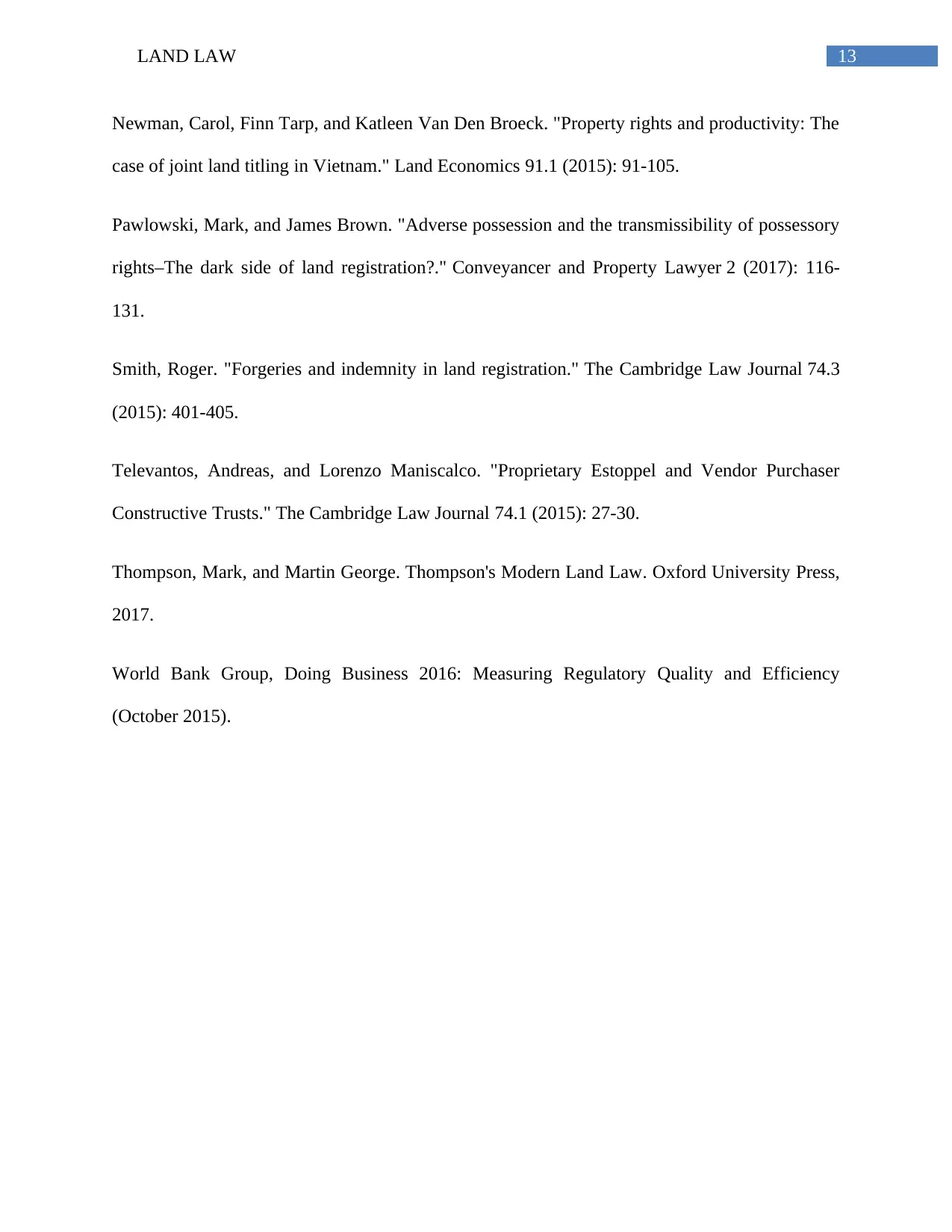
13LAND LAW
Newman, Carol, Finn Tarp, and Katleen Van Den Broeck. "Property rights and productivity: The
case of joint land titling in Vietnam." Land Economics 91.1 (2015): 91-105.
Pawlowski, Mark, and James Brown. "Adverse possession and the transmissibility of possessory
rights–The dark side of land registration?." Conveyancer and Property Lawyer 2 (2017): 116-
131.
Smith, Roger. "Forgeries and indemnity in land registration." The Cambridge Law Journal 74.3
(2015): 401-405.
Televantos, Andreas, and Lorenzo Maniscalco. "Proprietary Estoppel and Vendor Purchaser
Constructive Trusts." The Cambridge Law Journal 74.1 (2015): 27-30.
Thompson, Mark, and Martin George. Thompson's Modern Land Law. Oxford University Press,
2017.
World Bank Group, Doing Business 2016: Measuring Regulatory Quality and Efficiency
(October 2015).
Newman, Carol, Finn Tarp, and Katleen Van Den Broeck. "Property rights and productivity: The
case of joint land titling in Vietnam." Land Economics 91.1 (2015): 91-105.
Pawlowski, Mark, and James Brown. "Adverse possession and the transmissibility of possessory
rights–The dark side of land registration?." Conveyancer and Property Lawyer 2 (2017): 116-
131.
Smith, Roger. "Forgeries and indemnity in land registration." The Cambridge Law Journal 74.3
(2015): 401-405.
Televantos, Andreas, and Lorenzo Maniscalco. "Proprietary Estoppel and Vendor Purchaser
Constructive Trusts." The Cambridge Law Journal 74.1 (2015): 27-30.
Thompson, Mark, and Martin George. Thompson's Modern Land Law. Oxford University Press,
2017.
World Bank Group, Doing Business 2016: Measuring Regulatory Quality and Efficiency
(October 2015).
1 out of 14
Related Documents
Your All-in-One AI-Powered Toolkit for Academic Success.
+13062052269
info@desklib.com
Available 24*7 on WhatsApp / Email
![[object Object]](/_next/static/media/star-bottom.7253800d.svg)
Unlock your academic potential
© 2024 | Zucol Services PVT LTD | All rights reserved.





